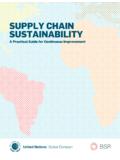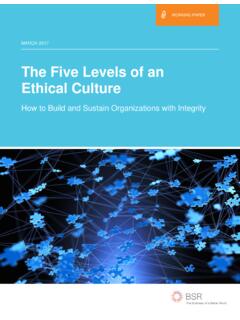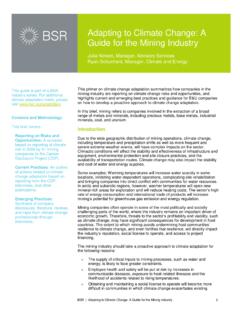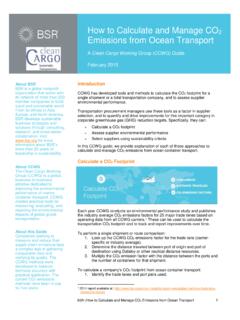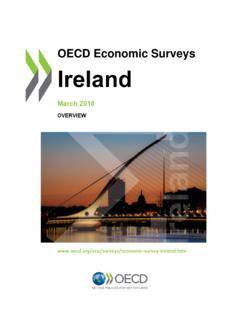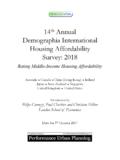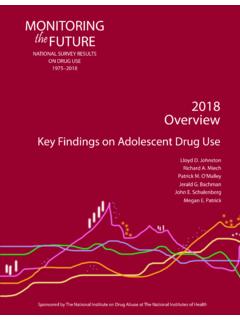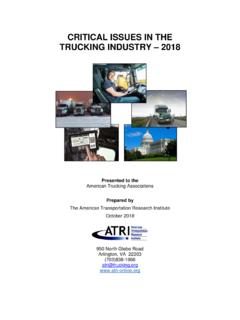Transcription of The State of Sustainable Business 2018 Aug15 - bsr.org
1 The State of Sustainable Business 2018 Results of the 10thAnnual Survey of Sustainable Business Leaders20182 Table of ContentsIntroduction + Key Findings3 Sustainability Priorities9 Sustainability Management14 Sustainable Development Goals23 Focus Areas29 Climate Change32 Human Rights36 Inclusive Economy40 Supply Chain44 Women s Empowerment48 Evolution of the Sustainability Function52 Introduction + Key Findings4 About This Research The 10th Annual BSR/GlobeScan State of Sustainable Business Surveyprovides insight into the world of Sustainable Business and identifies common perceptions and practices of corporate sustainability professionals. In addition to measuring shifting priorities and challenges in corporate sustainability, this year s survey presented a unique opportunity to understand how Business is responding to the changing social landscape.
2 To hone in on actions of companies within the Sustainable Business community, this year s data draws from the responses of one sustainability practitioner at each of 152 BSR member companies who participated. The survey was fielded fully online among the BSR member network, with responses collected between March 22 and May 16, 2018 . All field work and stakeholder outreach was managed independently by GlobeScan. 5 Sample Breakdown: All Company RespondentsJob LevelVice president or above24%Director33%Manager or below41%Other3%RegionNorth America53%Europe24%Otherregions23%Asia18 %Latin America2%Oceania2%Africa2%SectorConsumer Products and Retail24%Information and Communications Technology12%Healthcare11%Energy and Extractives10%Transportand Logistics9%Other*8%Food, Beverage, and Agriculture7%Financial Services 7%ProfessionalServices5%Media and Entertainment3%Heavy Manufacturing 3%Power and Utilities2%Infrastructure1%Travel and Tourism1%*Examples of Other sectors named include Conglomerate, Chemicals, Business Services, Packaging, and Breakdown.
3 Sector Reporting GroupsSector Groupings Included in This ReportAll Company Respondents, 2018qConsumer Products and RetailqFood, Agriculture, and BeverageqTravel and TourismqInformation and Communications Technology qMedia and EntertainmentqProfessional ServicesqEnergy and ExtractivesqHeavy ManufacturingqTransport and LogisticsqPower and UtilitiesqInfrastructureqFinancial ServicesqHealthcareqOther7 Key Findings Companies are defining a new sustainability agenda: Corporate integrity and diversity and inclusion, while longstanding corporate issues, are top priorities for sustainability efforts in 2018 perhaps a reflection of recent political, technological, and social transformations that have accelerated socially responsible activism. Climate change and human rights remain in the top four priority issues, while less than half of companies are prioritizing inclusive growth or public policy frameworks.
4 Disruptive technologies, such as artificial intelligence, concern over data privacy and ownership, and disruptions to climate and energy systems are shaping future Business strategies. Priority issues are still more driven by risk management than value creation. Sustainability needs to be integrated into strategy: Three-quarters of practitioners observe that effectively navigating global megatrends means ensuring that sustainability is a mainstream Business issue, necessitating both organizational integration and new approaches to strategy and governance. SDGs are driving strategy: There has been a significant increase in companies using the SDGs to inform their goals. Companies have limited focus on value chain impacts: Companies take an inconsistent approach to addressing key issues across their value chains, with efforts to go beyond their own operations still limited.
5 There is a need for more cross-functional collaboration: Sustainability teams still struggle to get traction with strategic planning and core Business functions. There is surprisingly limited engagement with investor relations, marketing, or human resources despite the recognized significance of investors, customers, and employees as key drivers of sustainability There is room to improve communications:Fewer than half of BSR members find their own sustainability communications to customers or consumers to be Convergence of Ethics, Integrity, and Sustainability Corporate integrity and ethics are top priorities for sustainability teams in 2018 . Ethical issues have historically been dealt with by compliance and legal teams, but this is now evolving, thanks to the following trends: We are in an era of hyper-transparency where companies need to behave as if everything they say or do may become public; reputation management is complex and has high stakes.
6 There is increasing concern over corporate lobbying and tax from the public, accelerated by a new whistleblowing model of large-scale data leaks. The growth of socially responsible activism, especially in the , has driven a rethink on political engagement and corporate values and requires increasing coordination between legal, sustainability, and corporate affairs teams. Uncertain and inconsistent regulation means that legal risk is no longer a good proxy for reputational risk. Investor pressure to demonstrate social purpose and long-term resilience is increasing as awareness grows that good management of sustainability issues is aligned with good financial performance over the long term. When compared to the social media conversation about company exposure to ESG risks, both companies and the public think ethics/integrity and diversity/inclusion are the top issues.
7 The public, however, places a higher concern on corporate involvement in public policy issues, a concern not expressed by BSR members. Companies are experimenting with new governance structures and approaches to manage evolving stakeholder concerns. This necessitates closer coordination between the sustainability, ethics and compliance, and government/corporate affairs Priorities10 Over the next 12 months, companies indicate their sustainability efforts will be prioritized around ethics, diversity, climate change, and human Sustainability Priorities Over Next 12 MonthsAll Company Respondents, 2018Q2. When you think about the focus of your company s sustainability efforts in the next 12 months, how much of a priority is each of the following issues?
8 Please use a 5-point scale where 1 is not at all a priority and 5 is a very significant priority. 11At the sector level, companies are placing a greater priority on those mega-trends most closely associated with their of Global Mega-Trends in Business StrategyAll Company Respondents, Total Mentions, 2018Q21. Which three, if any, of the following challenges/mega-trends is your company prioritizing the most in its Business strategy?Given the impact that automation, artificial intelligence, and climate change are likely to have on employment and social upheaval, the low priority given to rising inequality, migration, and polarization is of practitioners say that sustainability needs to be better integrated into Business strategy to address global Which, if any, of the following are most important actions for companies to address these new global opportunities and challenges?
9 Most Important Actions to Address Global Mega-TrendsAll Company Respondents, Total Mentions, 2018 Limited confidence in the value of corporate voice, policy frameworks, or even transparent reporting in addressing global mega-trends implies that current resources and time may not be well aligned with perceived importance of making sustainability integral to Business strategy is more pronounced outside of North America; North American companiesare more focused on long-term value creation and CEO activism than Which, if any, of the following are most important actions for companies to address these new global opportunities and challenges? Most Important Actions to Address Global Mega-TrendsAll Company Respondents, Total Mentions, by Region, 2018 Sustainability Management15 Sustainability professionals feel that large global companies, NGOs, and investors are all more effective than governments at advancing the sustainability Below is a list of types of organizations involved in making progress on sustainability.
10 Please select up to three that you feel are currently having the greatest positive impact on advancing Types Involved in Making Progress on SustainabilityAll Company Respondents Identifying Each as a Top-Three Organization, 2018 Large global companies continue to be recognized as having the most positive impact with regard to advancing sustainability. The relative lack of recognition of the impact of national or local governments in advancing sustainability is , the relatively high ranking of investors is an important finding, indicating that companies are feeling the influence of the investment community on remains the most powerful driver of sustainability efforts, followed by consumer/customer demand and operational Which of the following are the most important drivers for your company s sustainability efforts?

